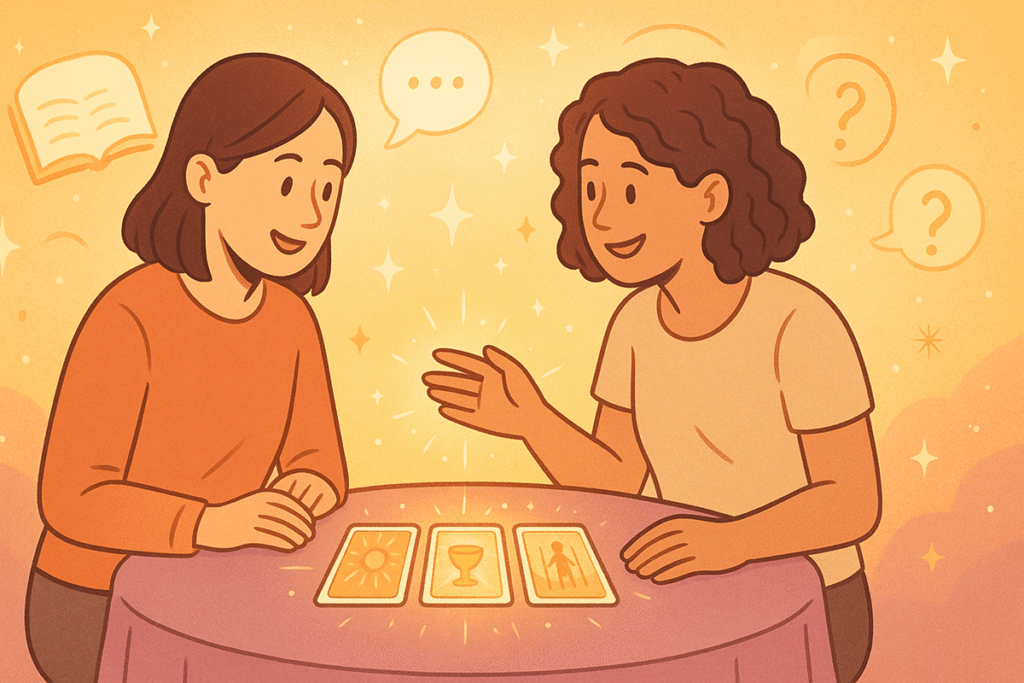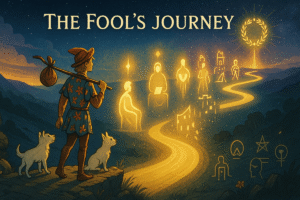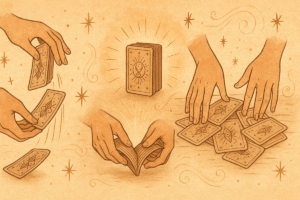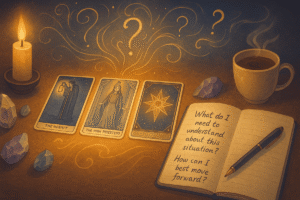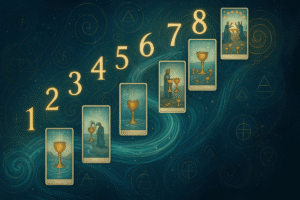Table of Contents
There’s something special about the moment when a friend asks if you’ll read tarot for them. It feels like trust, maybe even a little bit of magic. But honestly? It can also feel overwhelming, especially if you’re still figuring out the cards yourself. I remember the first time someone asked me, and I felt this weird mix of excitement and panic. What if I said the wrong thing? What if they took my interpretation too seriously?
The truth is, reading tarot for another person requires a different approach than reading for yourself. It’s not just about knowing what the cards mean. It’s about creating a safe, supportive space where your friend can explore their own thoughts and feelings. And perhaps most importantly, it’s about understanding where your role ends and their personal agency begins.
Why Reading for Others Feels Different
When you pull cards for yourself, you’re having a private conversation. You can interpret things however you want, sit with uncomfortable truths, or completely ignore what doesn’t resonate. There’s no pressure, no one else’s expectations to manage.
But when you read tarot for a friend, the dynamic shifts. Suddenly, you’re holding space for someone else’s questions, concerns, and vulnerabilities. They might be coming to you during a difficult time, looking for clarity or reassurance. The weight of that trust matters.
I think what makes it tricky is that friends often expect more certainty than the cards can actually provide. They might want you to tell them what’s going to happen, or what they should do. And while it’s tempting to offer that kind of guidance, especially when you care about someone, it’s not really what tarot is for. At least not in a way that’s helpful or responsible.
The Foundation of an Ethical Session
Before you even shuffle the deck, it helps to set some ground rules. Not in a formal, weird way, but just as a natural part of starting the session. I usually begin by explaining what tarot can and cannot do.
Tarot is brilliant for reflection. It’s like holding up a mirror to your current situation and asking yourself questions you might not have considered. The images, symbols, and stories in the cards can unlock new perspectives and help you see patterns in your thinking or behavior.
What tarot is not, though, is a fortune telling device that predicts the future with certainty. It’s also not a replacement for professional advice in areas that actually require expertise. This is where things get really important.
Your friend might ask about their health, their finances, legal matters, or major medical decisions. These are what Google calls YMYL topics, which stands for Your Money or Your Life. And here’s the thing, you shouldn’t be giving advice in these areas even if a card seems to suggest something specific.
If the Three of Swords appears and your friend says, “Does this mean my chest pain is serious?” the answer is not to interpret the card. The answer is, “I can’t speak to health concerns, but if you’re worried about chest pain, please talk to a doctor.” It might feel like you’re dodging the question, but you’re actually being responsible.
Reframing the Entire Experience
One of the best things you can do when you read tarot for a friend is to stop calling it a “reading” altogether. I know that sounds strange, but hear me out.
Instead, think of it as a creative brainstorming session. Or a reflective conversation. Or even a journaling exercise that happens to use cards as prompts. When you frame it this way, it takes the pressure off both of you. You’re not claiming to know the future or have special insight into their life. You’re just offering a different lens through which they can examine their own thoughts.
This shift in framing does something powerful. It puts your friend in the driver’s seat. They’re not passively receiving information from you. They’re actively engaging with the cards, deciding what resonates, and drawing their own conclusions. This is not only safer from an ethical standpoint, it’s also more empowering for them.
The Art of Asking Questions Instead of Giving Answers
Here’s where the real skill comes in. When you read tarot for a friend, your job is not to interpret the cards and deliver a verdict. Your job is to facilitate their own exploration.
Let’s say you draw the Tower card. Instead of saying, “This means something in your life is about to collapse,” try asking, “What does this image bring up for you? Are there any structures or situations in your life that feel unstable right now?”
See the difference? You’re inviting them to connect the card to their own experience. Maybe they immediately think of a relationship that’s been rocky. Maybe they think of a job that no longer fits. Or maybe the card doesn’t resonate at all, and that’s okay too.
Some questions I find helpful include things like, “What part of this card catches your attention?” or “If this card were giving you permission to do something, what might that be?” or even “How does this card make you feel, and what might that feeling be telling you?”
These open ended questions encourage reflection without imposing your interpretation. They also help your friend practice using tarot as a tool for self discovery, which means they’ll be better equipped to work with the cards on their own in the future.
Knowing When to Step Back
There will be moments when your friend wants more than reflection. They might push you to tell them what to do, especially if they’re facing a difficult decision. This is one of the hardest parts of reading for others because you want to help.
But giving directive advice, particularly in areas where you have no expertise, is not helping. It’s potentially harmful. If your friend asks whether they should take a specific medication, quit their job without another one lined up, or pursue a major legal action, the cards cannot answer that. And neither should you.
In these situations, I try to acknowledge the difficulty of their situation while gently redirecting. Something like, “I can see this is really weighing on you, and these cards can help you explore your feelings about it. But for a decision this significant, you’d benefit from talking to someone with professional expertise in this area.”
It might feel like a letdown in the moment. Your friend might even seem disappointed. But you’re actually showing them real respect by recognizing the limits of what you can responsibly offer.
Creating a Supportive Atmosphere
Beyond the specific words you use, the overall atmosphere you create matters tremendously. I’ve found that reading for friends works best when it feels casual and conversational rather than formal or mystical.
You don’t need dim lighting, incense, or any special ritual unless that genuinely helps you focus. What you do need is a space where your friend feels comfortable being honest and vulnerable. Sometimes that’s a quiet corner. Sometimes it’s over coffee at a kitchen table.
Pay attention to their body language and emotional state throughout the session. If they seem overwhelmed or upset, it’s perfectly fine to pause or even stop entirely. You can say something like, “I’m noticing this is bringing up some heavy stuff. Do you want to keep going, or would you rather take a break?”
Checking in like this reinforces that they’re in control of the experience. It also models good emotional boundaries, which is something we could all use more practice with.
What to Do After the Session
Once you’ve finished looking at the cards together, I think it helps to do a little debrief. Ask your friend what resonated most, or what they’re taking away from the experience. This gives them a chance to articulate their insights, which can make those insights feel more solid and real.
You might also want to suggest that they journal about the session later. Writing down their thoughts can help them continue processing and might reveal connections they didn’t notice in the moment.
And here’s something I learned the hard way. Don’t follow up days later asking if anything you “predicted” came true. This reinforces the idea that tarot is about fortune telling, which undermines everything you’ve been trying to do. If your friend wants to share how they’re feeling or what they’ve been thinking about, they will.
Building Your Confidence Over Time
Reading tarot for a friend gets easier with practice, but the learning never really stops. Each person brings different energy, different questions, different ways of engaging with the cards. What works beautifully with one friend might fall flat with another.
The key is to stay humble and keep your focus where it belongs, on facilitating reflection rather than demonstrating your knowledge or abilities. The best sessions I’ve had were the ones where I said the least and asked the most. Where my friend had those light bulb moments of recognition, not because I told them something profound, but because the cards helped them see something they already knew on some level.
Perhaps the most important thing to remember is that you’re offering a tool, not a service. You’re not a therapist, a financial advisor, or a fortune teller. You’re a friend who happens to have a deck of cards and some curiosity about how they work. That’s enough. In fact, it’s more than enough when approached with care, respect, and clear boundaries.
Reading tarot for a friend can be a meaningful way to support someone you care about. Just remember that the real magic isn’t in predicting the future or solving their problems. It’s in helping them access their own wisdom and trust their own intuition. When you approach it that way, everyone benefits.
Frequently Asked Questions
What if I get nervous and my mind goes blank during the reading?
Take a deep breath and pause. It’s completely okay to have silence while you gather your thoughts. If you’re stuck on a card, simply describe what you see in the image and ask your friend what stands out to them or how it makes them feel. You can always move to the next card and come back later. Remember, this is a conversation, not a performance.
Should I tell my friend if a card seems negative or scary?
Yes, but frame it as an invitation for reflection rather than a prediction or bad omen. Instead of saying something like “this card means trouble ahead,” ask questions like “what challenges are you currently navigating?” or “where do you feel resistance in this situation?” Help them find their own meaning in the card rather than delivering a verdict that might cause unnecessary worry.
What do I do if my friend wants me to read about their health or finances?
Gently but firmly redirect them. You can say something like, “I care about you, which is why I need to be honest that tarot can’t replace professional advice for health or financial decisions. But we can explore how you’re feeling about the situation or what questions you might want to ask a doctor or financial advisor.” Set this boundary with love and your friend will respect it.
How do I handle it if my friend gets upset or doesn’t like what the cards show?
First, check in with them and ask if they want to continue or take a break. Remind them that they’re in control of the session and can stop anytime. If they’re interpreting the cards in a way that’s upsetting them, help redirect their focus toward what actions they can take or what the cards might be inviting them to consider. The cards are prompts for reflection, not fixed destinies, so emphasize their agency in the situation.
Can I do a reading for a friend if I only know basic card meanings?
Absolutely. You don’t need to be an expert to facilitate a meaningful reflection session. Focus on asking good questions, noticing what draws your friend’s attention in the cards, and letting them do most of the interpreting. Your role is to hold space and guide the conversation, not to have all the answers. Some of the best sessions happen when the reader knows less because it puts more power in the friend’s hands.

